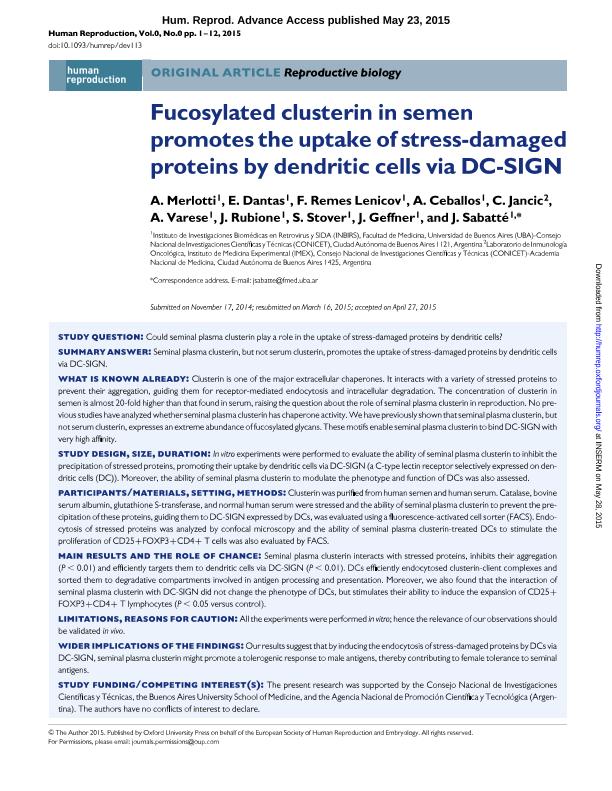Artículo
Fucosylated clusterin in semen promotes the uptake of stress-damaged proteins by dendritic cells via DC-SIGN
Merlotti Ippólito, Antonela ; Dantas, Ezequiel Carlos
; Dantas, Ezequiel Carlos ; Remes Lenicov, Federico
; Remes Lenicov, Federico ; Ceballos, Ana
; Ceballos, Ana ; Jancic, Carolina Cristina
; Jancic, Carolina Cristina ; Varese, Augusto
; Varese, Augusto ; Rubione, Julia
; Rubione, Julia ; Stover, Juliana Beatriz
; Stover, Juliana Beatriz ; Geffner, Jorge Raúl
; Geffner, Jorge Raúl ; Sabatte, Juan Atilio
; Sabatte, Juan Atilio
 ; Dantas, Ezequiel Carlos
; Dantas, Ezequiel Carlos ; Remes Lenicov, Federico
; Remes Lenicov, Federico ; Ceballos, Ana
; Ceballos, Ana ; Jancic, Carolina Cristina
; Jancic, Carolina Cristina ; Varese, Augusto
; Varese, Augusto ; Rubione, Julia
; Rubione, Julia ; Stover, Juliana Beatriz
; Stover, Juliana Beatriz ; Geffner, Jorge Raúl
; Geffner, Jorge Raúl ; Sabatte, Juan Atilio
; Sabatte, Juan Atilio
Fecha de publicación:
02/2015
Editorial:
Oxford University Press
Revista:
Human Reproduction
ISSN:
0268-1161
Idioma:
Inglés
Tipo de recurso:
Artículo publicado
Clasificación temática:
Resumen
STUDY QUESTION: Could seminal plasma clusterin play a role in the uptake of stress-damaged proteins by dendritic cells? SUMMARY ANSWER: Seminal plasma clusterin, but not serum clusterin, promotes the uptake of stress-damaged proteins by dendritic cells via DC-SIGN. WHAT IS KNOWN ALREADY: Clusterin is one of the major extracellular chaperones. It interacts with a variety of stressed proteins to prevent their aggregation, guiding them for receptor-mediated endocytosis and intracellular degradation. The concentration of clusterin in semen is almost 20-fold higher than that found in serum, raising the question about the role of seminal plasma clusterin in reproduction. No previous studies have analyzed whether seminal plasma clusterin has chaperone activity. We have previously shown that seminal plasma clusterin, but not serum clusterin, expresses an extreme abundance of fucosylated glycans. These motifs enable seminal plasma clusterin to bind DC-SIGN with very high affinity. STUDY DESIGN, SIZE, DURATION: In vitro experiments were performed to evaluate the ability of seminal plasma clusterin to inhibit the precipitation of stressed proteins, promoting their uptake by dendritic cells via DC-SIGN (a C-type lectin receptor selectively expressed on dendritic cells (DC)). Moreover, the ability of seminal plasma clusterin to modulate the phenotype and function of DCs was also assessed. PARTICIPANTS/MATERIALS, SETTING, METHODS: Clusterin was purified from human semen and human serum. Catalase, bovine serum albumin, glutathione S-transferase, and normal human serum were stressed and the ability of seminal plasma clusterin to prevent the precipitation of these proteins, guiding them to DC-SIGN expressed by DCs, was evaluated using a fluorescence-activated cell sorter (FACS). Endocytosis of stressed proteins was analyzed by confocal microscopy and the ability of seminal plasma clusterin-treated DCs to stimulate the proliferation of CD25+FOXP3+CD4+ T cells was also evaluated by FACS. MAIN RESULTS AND THE ROLE OF CHANCE: Seminal plasma clusterin interacts with stressed proteins, inhibits their aggregation (P < 0.01) and efficiently targets them to dendritic cells via DC-SIGN (P < 0.01). DCs efficiently endocytosed clusterin-client complexes and sorted them to degradative compartments involved in antigen processing and presentation. Moreover, we also found that the interaction of seminal plasma clusterin with DC-SIGN did not change the phenotype of DCs, but stimulates their ability to induce the expansion of CD25+FOXP3+CD4+ T lymphocytes (P < 0.05 versus control). LIMITATIONS, REASONS FOR CAUTION: All the experiments were performed in vitro; hence the relevance of our observations should be validated in vivo. WIDER IMPLICATIONS OF THE FINDINGS: Our results suggest that by inducing the endocytosis of stress-damaged proteins by DCs via DC-SIGN, seminal plasma clusterin might promote a tolerogenic response to male antigens, thereby contributing to female tolerance to seminal antigens. STUDY FUNDING/COMPETING INTEREST(S): The present research was supported by the Consejo Nacional de Investigaciones Científicas y Técnicas, the Buenos Aires University School of Medicine, and the Agencia Nacional de Promoción Científica y Tecnológica (Argentina). The authors have no conflicts of interest to declare.
Palabras clave:
Clusterin
,
Dc-Sign
,
Dendritic
,
Semen
,
Tolerance
Archivos asociados
Licencia
Identificadores
Colecciones
Articulos(IMEX)
Articulos de INST.DE MEDICINA EXPERIMENTAL
Articulos de INST.DE MEDICINA EXPERIMENTAL
Articulos(INBIRS)
Articulos de INSTITUTO DE INVESTIGACIONES BIOMEDICAS EN RETROVIRUS Y SIDA
Articulos de INSTITUTO DE INVESTIGACIONES BIOMEDICAS EN RETROVIRUS Y SIDA
Citación
Merlotti Ippólito, Antonela; Dantas, Ezequiel Carlos; Remes Lenicov, Federico; Ceballos, Ana; Jancic, Carolina Cristina; et al.; Fucosylated clusterin in semen promotes the uptake of stress-damaged proteins by dendritic cells via DC-SIGN; Oxford University Press; Human Reproduction; 30; 7; 2-2015; 1545-1556
Compartir
Altmétricas



